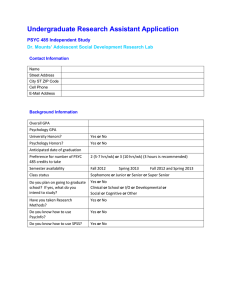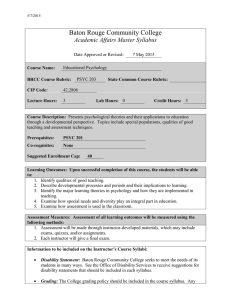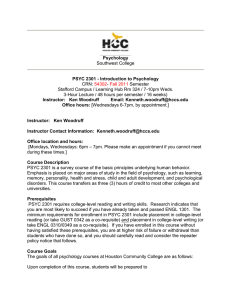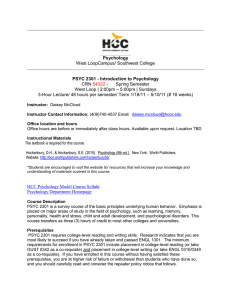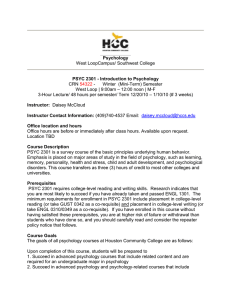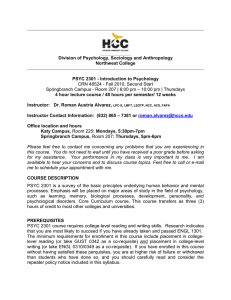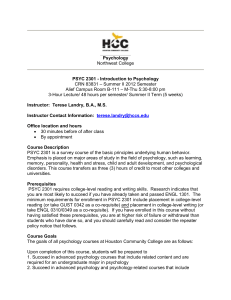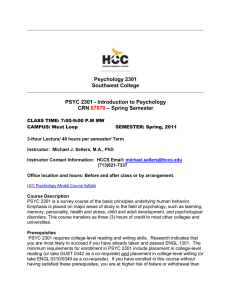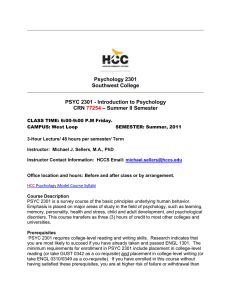Intro Syllabus Fall 2015 M-W.doc
advertisement
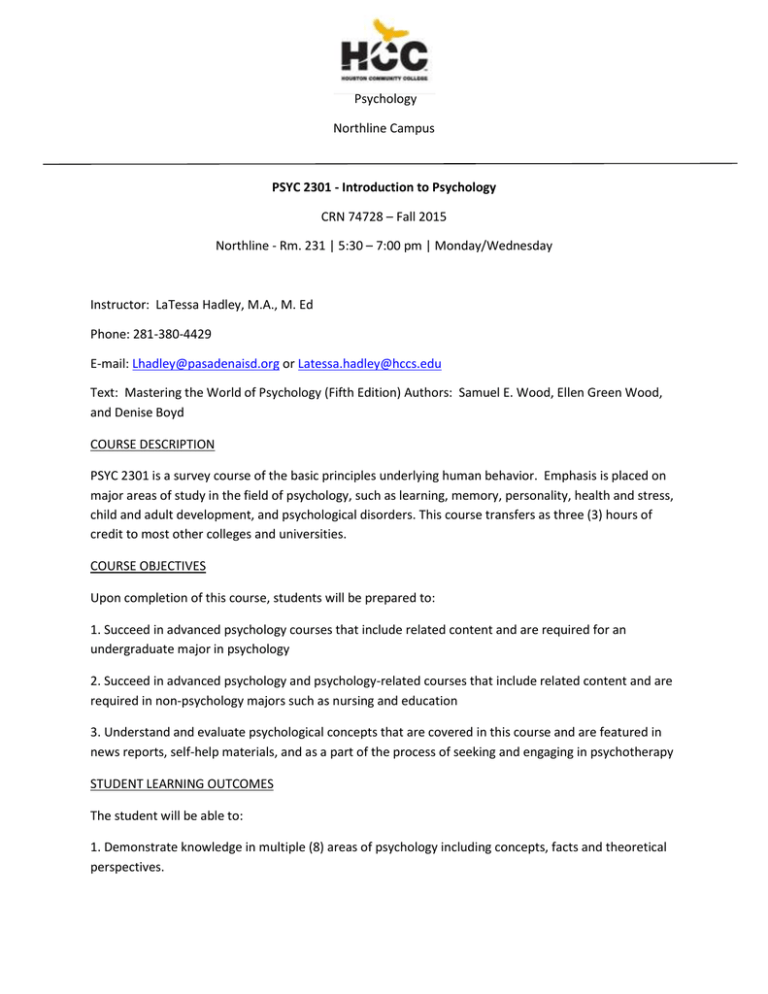
Psychology Northline Campus PSYC 2301 - Introduction to Psychology CRN 74728 – Fall 2015 Northline - Rm. 231 | 5:30 – 7:00 pm | Monday/Wednesday Instructor: LaTessa Hadley, M.A., M. Ed Phone: 281-380-4429 E-mail: Lhadley@pasadenaisd.org or Latessa.hadley@hccs.edu Text: Mastering the World of Psychology (Fifth Edition) Authors: Samuel E. Wood, Ellen Green Wood, and Denise Boyd COURSE DESCRIPTION PSYC 2301 is a survey course of the basic principles underlying human behavior. Emphasis is placed on major areas of study in the field of psychology, such as learning, memory, personality, health and stress, child and adult development, and psychological disorders. This course transfers as three (3) hours of credit to most other colleges and universities. COURSE OBJECTIVES Upon completion of this course, students will be prepared to: 1. Succeed in advanced psychology courses that include related content and are required for an undergraduate major in psychology 2. Succeed in advanced psychology and psychology-related courses that include related content and are required in non-psychology majors such as nursing and education 3. Understand and evaluate psychological concepts that are covered in this course and are featured in news reports, self-help materials, and as a part of the process of seeking and engaging in psychotherapy STUDENT LEARNING OUTCOMES The student will be able to: 1. Demonstrate knowledge in multiple (8) areas of psychology including concepts, facts and theoretical perspectives. 2. Define and identify the basic research and evaluation methods used in psychology, including the strengths and weaknesses of each method. 3. Demonstrate knowledge of and identify concepts related to personal development and the development and behavior of others. 4. Apply psychological concepts to the solution of current issues and problems including ethics, coping with stressful events, health and wellness, parenting, learning, memory, and /or evaluation of media presentations. CORE CURRICULUM Credit: 3 (3 lecture) PSYC 2301 satisfies the social science requirement in the HCCS core curriculum. The HCCS Psychology Discipline Committee has specified that address the goals of the core curriculum as follows: * Reading at the college level means having the ability to analyze and interpret a variety of printed materials, books, and document. All students in PSYC 2301 are required to read a college-level textbook. * Writing at the college level means having the ability to produce clear, correct, and coherent prose adapted to purpose, occasion, and audience. In addition to knowing correct grammar, spelling, and punctuation, students should also become familiar with the writing process, including how to discover a topic, how to develop and organize it, and how to phrase it effectively for their audience. All instructors in PSYC 2301 include at least one written assignment in their syllabi. * Effective speaking is the ability to communicate orally in clear, coherent, and persuasive language appropriate to purpose, occasion, and audience. Students in PSYC 2301 are required to communicate about course content in formal or informal ways as determined by the requirements of each instructor's course syllabus. * Listening at the college level means the ability to analyze and interpret various forms of spoken communication. Students in PSYC 2301 are required to listen to presentations and/or discussions of course content in formal or informal ways as determined by the requirements of each instructor's course syllabus. * Critical thinking embraces methods for applying both qualitative and quantitative skills analytically and creatively to subject matter in order to evaluate arguments and to construct alternative strategies. Problem solving is one of the applications of critical thinking used to address an identified task. Students in PSYC 2301 are required to exhibit critical thinking in formal or informal ways as determined by the requirements of each instructor's course syllabus. * Computer literacy at the college level means having the ability to use computer-based technology in communicating, solving problems, and acquiring information. Core-educated students should have an understanding of the limits, problems, and possibilities associated with the use of technology and should have the tools necessary to evaluate and learn new technologies as they become available. Students in PSYC 2301 are required to exhibit computer literacy in formal or informal ways as determined by the requirements of each instructor's course syllabus. GRADING POLICY & ASSIGNMENTS Grades in this class will consist of a variety of activities that may include, but are not limited to: class discussions, quizzes, reflection papers, projects, observations, experiments, internet research/participation, and other assignments as determined appropriate by the instructor. There will be some sort of grade at the end of each chapter. Assignments: 5 Quizzes, 6 End of Chapter Assignments, Behavior Modification Project (x’s 3), and Final (x’s 3). Your lowest grade will be dropped. End of semester grades will be determined as follows: A = 90 - 100 B = 80 - 89 C = 70 - 79 D = 60 - 69 F = 0 - 59 ASSIGNMENT MAKE-UP POLICY Assignments will NOT be accepted late! Please make arrangements to get assignments turned in ahead of time if you know you will be absent. No exceptions! You will only be allowed to make up ONE missed quiz/assignment grade. All other quizzes/assignments will be counted as a ZERO. EXTRA CREDIT There will be a few opportunities to earn extra credit throughout the course. In order to receive credit, you must be in attendance on the day it is given. Extra credit will NOT be accepted late. ATTENDANCE I understand that life happens and things will arise, however, attendance should be priority! You must be in class to learn and be successful in this course. Your average will suffer if you miss frequently. Please communicate with me if you will be absent for multiple days. It is your responsibility to get notes from a peer when absent. I do not send out my powerpoints/notes. CLASS PARTICIPATION Class participation is appreciated. It makes class more enjoyable for all of us and gives me the opportunity to learn things from my students. If you choose not to participate in in-class activities, points may be deducted from your grade. CLASSROOM ETIQUETTE If you want to learn and be successful this semester, you must attend class and be attentive while present. Please keep that in mind throughout the semester. Please turn your phones to vibrate/silent during lectures. In case of an emergency, please step outside of class to use your phone. Texting in class will not be tolerated! You will be asked to leave. Restroom breaks may be taken at your discretion. Food and drinks are allowed in class. Please clean up behind yourself. ACADEMIC DISHONESTY Plagiarism, cheating, and other forms of academic dishonesty are strictly prohibited by the HCC policy and the rules of this class. This type of behavior WILL NOT be tolerated. Any student caught cheating as a first offense will receive a zero for that particular assignment. For the second offence, the student will receive a grade of “F” for the course. AMERICAN DISABILITY ASSOCIATION STATEMENT (ADA) Any student with a documented disability (e.g. physical, learning, psychiatric, developmental, vision, hearing, etc.) who needs to arrange reasonable accommodations must contact the Disability Support Services (DSS) Counselor at the beginning of each semester. Faculty members are authorized to provide only the accommodations requested by the DSS Office. Students who are requesting special testing accommodations must first contact the appropriate (most convenient) Disability Services Office for assistance at 713-718-8420. After student accommodation letters have been approved by the DSS office, students will receive an email confirmation informing them of the Instructional Support Specialist assigned to their professor. WITHDRAWAL POLICY According to HCC Policy, it is the student’s responsibility to withdraw officially from a course to prevent an “F” from appearing on his/her transcript. If you wish to withdraw, it is recommended that you submit the withdrawal form to the registrar’s office. Please note that if you are attending class after the official drop date, you will receive the grade you have earned. The last day to withdraw is October 30th, 2015 at 4:30 p.m. INSTRUCTOR’S RIGHT TO MODIFY THE SYLLABUS The instructor reserves the right to modify this syllabus and will notify the class of any changes in a timely manner. If you are absent, it is your responsibility to acquire the changes. Course Schedule It is YOUR responsibility to keep up with the items on this agenda. Date Chapter 8/24 8/26 8/31 9/2 9/7 9/9 9/14 9/16 9/21 9/23 9/28 Introduction Chapter 1-Introduction to Psychology Chapter 1-Introduction to Psychology Chapter 1-Introduction to Psychology Labor Day Holiday Chapter 2-Biology & Behavior Chapter 2-Biology & Behavior Chapter 4- Consciousness Chapter 4- Consciousness Chapter 5-Learning Chapter 5-Learning 9/30 10/5 10/7 Behavior Modification Project Behavior Modification Project Chapter 6-Human Memory 10/12 10/14 10/19 10/21 10/26 10/28 11/2 11/4 11/9 11/11 11/16 11/18 11/23 11/25 11/30 12/2 12/7 Chapter 6-Human Memory Chapter 8-Human Development Chapter 8-Human Development Chapter 10-Health & Stress Chapter 10-Health & Stress Gender & Sexuality Chapter 11-Personality Theory & Assessment Chapter 11-Personality Theory & Assessment Chapter 12-Psychological Disorders Chapter 12-Psychological Disorders Chapter 13-Treatment of Psychological Disorders Chapter 14- Social Behavior Chapter 14- Social Behavior Chapter 14-Social Behavior Make-up Assignments Review for Final Final Assignment Perspectives in Psych Assignment Mini-Study Assignment Quiz Dream Assignment Behavior Modification Project & Extra Credit Behavior Modification Project Due! Quiz Lifespan Assignment Quiz Extra Credit Quiz Sentence Stem Assignment Quiz Unfinished Business Assignment Videos Quiz Final
